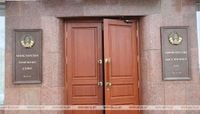Diplomatic tensions between Belarus and its European neighbors reached a new high on Friday, September 19, 2025, as the Belarusian Ministry of Foreign Affairs ordered a Czech diplomat to leave the country and summoned a senior Polish envoy for discussions. This move, widely seen as a tit-for-tat response, came after both the Czech Republic and Poland expelled Belarusian diplomats earlier in the month over allegations of espionage. The escalating standoff underscores the deepening rift between Minsk and the European Union, with broader implications for regional security and international alliances.
The latest diplomatic clash began when the Czech Republic announced on September 8 that it had dismantled a spy network operating in Europe, allegedly controlled by Belarus. According to the Czech intelligence agency BIS, the operation uncovered agents from Belarus’ KGB security agency working not only in the Czech Republic but also in several other European countries, including Hungary and Romania. The BIS explained that Belarusian diplomats’ ability to travel freely within the Schengen area had enabled the establishment of such a network. In a statement, BIS head Michal Koudelka emphasized, "To successfully counter these hostile activities in Europe, we need to restrict the movement of accredited diplomats from Russia and Belarus within the Schengen (borderless) area."
Following these revelations, Czech authorities expelled a Belarusian diplomat, citing the need to protect national and European security. Poland quickly followed suit, arresting an individual suspected of spying for Belarus and expelling a Belarusian diplomat accused of supporting aggressive actions against the Polish state. Polish Prime Minister Donald Tusk publicly confirmed the arrest, further intensifying the diplomatic standoff.
Belarus, led by long-serving President Alexander Lukashenko—a close ally of Russian President Vladimir Putin—swiftly retaliated. On September 19, the Belarusian Foreign Ministry summoned Tomáš Kryll, the Chargé d’Affaires of the Czech diplomatic mission in Belarus, informing him that a Czech diplomat (identified as a counsellor) had been declared persona non grata and must leave the country within 72 hours. In a statement, Foreign Ministry spokesman Ruslan Varan attributed the expulsion to “the result of years of cultivated bias against Belarus by the Czech authorities.” He added, “The Belarusian side considers this diplomatic incident to be closed. In the event of further escalation, Belarus will respond appropriately. This position has been communicated to Warsaw and Prague.”
Simultaneously, the Belarusian Foreign Ministry summoned Wojciech Filimonowicz, the Polish Chargé d’Affaires in Belarus, for what officials described as "a substantive conversation on the current state of Belarusian-Polish relations." The details of this discussion have not yet been made public, with Belarusian officials indicating they will release more information at a later date. However, the ministry made clear its displeasure with Poland’s actions, condemning Warsaw’s decision to expel a Belarusian diplomat and warning of further responses if the situation escalates.
The diplomatic fallout is set against a backdrop of mounting military tensions in the region. In September 2025, Belarus hosted major joint military exercises with Russian forces—known as the Zapad 2025 drills. Although the number of Russian troops participating was reportedly lower than in previous years, the exercises nonetheless heightened security concerns among neighboring NATO members. The drills began shortly after an unprecedented incursion of at least 19 Russian drones into Polish airspace, an incident that left NATO allies on high alert and prompted Poland to take decisive action.
In response to these exercises and the perceived threat from Belarus and Russia, Poland closed its border with Belarus completely in September 2025. The move was described by Polish officials as a necessary precaution given the scale of the Zapad 2025 military maneuvers and the involvement of Russian troops on Belarusian soil. The Czech Republic also took steps to bolster regional security, sending a military unit comprising three Mi-171Sh helicopters and up to 150 soldiers to Poland to strengthen NATO’s eastern flank.
The current diplomatic crisis is only the latest in a series of confrontations between Belarus and Western countries since the controversial 2020 Belarusian presidential election. Official results declared Alexander Lukashenko the winner, but the outcome was widely rejected by the opposition and most Western capitals, who accused the regime of electoral fraud. The subsequent crackdown on protests by Belarusian authorities led to a wave of Western sanctions, further isolating Minsk and pushing it closer to Moscow.
Belarus’ deepening alliance with Russia has had far-reaching consequences. Lukashenko allowed Russian forces to use Belarusian territory as a launching pad for Moscow’s full-scale invasion of Ukraine in February 2022, a move that drew international condemnation. Later, he authorized the deployment of Russian tactical nuclear missiles on Belarusian soil, further cementing the country’s strategic partnership with the Kremlin and raising the stakes for regional security.
For its part, the Belarusian government has consistently portrayed Western actions as unjustified and biased. The Foreign Ministry’s recent statements reflect this narrative, blaming the Czech authorities’ “years of prejudice” and “cultivated bias” for the current diplomatic spat. Minsk has framed its expulsions as necessary and proportionate responses to what it sees as hostile acts by its European neighbors.
European governments, however, maintain that their actions are driven by legitimate security concerns. The exposure of a Belarusian KGB spy network operating across the continent has alarmed intelligence agencies and policymakers alike. The Czech Republic and Poland, both members of NATO and the EU, argue that robust countermeasures—including expulsions and border closures—are essential to safeguarding national security and upholding the rule of law.
As the dust settles, all eyes remain on Minsk, Warsaw, and Prague. The Belarusian Foreign Ministry has signaled that it considers the immediate diplomatic incident resolved, but has left the door open for further action if provoked. The tense standoff serves as a stark reminder of the fragile security environment in Eastern Europe, where old alliances, new threats, and deep-seated mistrust continue to shape the region’s political landscape.
With military exercises winding down and diplomats shuttling between capitals, the next steps from each side will be closely watched—not just by those directly involved, but by an international community wary of further escalation. For now, the balance between confrontation and dialogue hangs in the air, as Belarus, the Czech Republic, and Poland navigate a diplomatic minefield that shows no signs of clearing any time soon.



